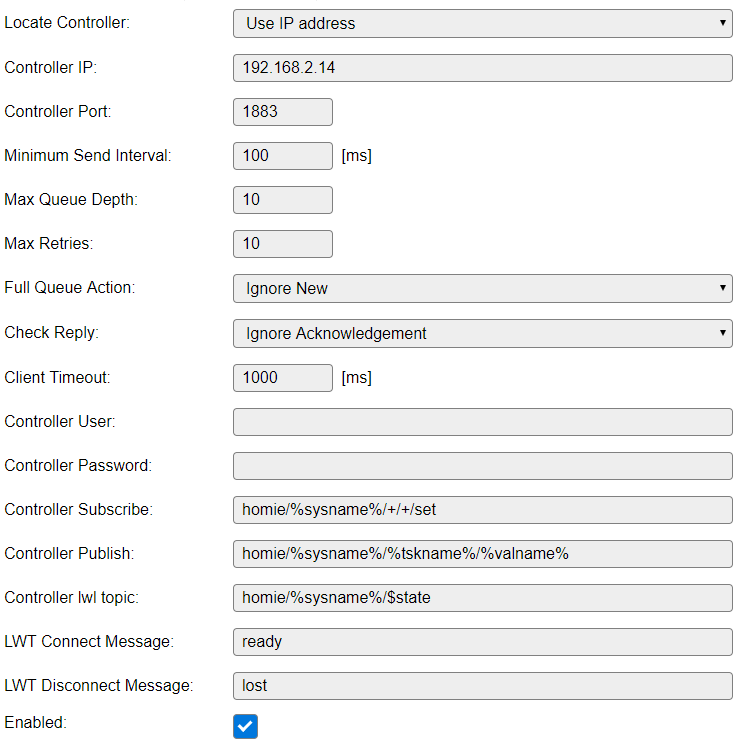Controller - Homie MQTT convention¶
Controller for communication following the Homie convention
Controller details¶
Type: Controller
Name: Homie MQTT (Version 3.0.1 & 4.0.0dev)
Status: TESTING
GitHub: C014.ino
Maintainer: .
Change log¶
Changed in version 2.0: …
added 2019/04/25 Initial alpha version of this plug-in.
Description¶
This controller connects to a MQTT Server providing auto-discover information and a communication protocol according to the Homie convention 3.0.1 and the future development version 4.0.0.
For more information head over to Homie convention
Idea is to provide an easy way to include ESPEasy in modern home automation systems without any or with as less effort as possible. Imagine your device pops up in openHAB 2.4 or higher as a new device and you only have to pic the values you are interested in. You can immediately see measurements or switch GPIOs without a single line of code.
When a MQTT connection is established after (re-)boot the controller sends auto-discovery information for system services like commands, basic GPIO functions and for all configured devices and there values. When all messages where sent successfully a homie compatible home automation server/hub or other compatible controllers should be able to detect the unit and establish two way communication.
The Generic - Homie receiver plug-in can be used to set values and trigger actions / rules.
MQTT topic scheme¶
A homie topic scheme always starts with the root topic homie followed by the unit name (homie uses the term device), device name (node in homie) and a value name.
homie/%unitname%/%devicename%/%valname%
updates or commands can be sent by appending /set to the topics for values which can receive data.
homie/%unitname%/%devicename%/%valname%/set
Prequesites¶
A MQTT server capable of storing messages sent with retain=true when QoS=0. Due to limitation (intentional not implemented due to low memory footprint and performance considerations) of the MQTT library (pubsubclient) used in ESPEasy it is only possible to send messages with QoS=0 which basically means fire and forget. The current MQTT specification says that the server SHOULD store these messages when they arrive via QoS=0. Some servers like the MQTT server currently build into openHAB 2.4 (moquette) is configured to ignore the retain flag and drop the message after delivery to the currently subscribed clients when QoS=0. Mosquito on the other hand store messages when retain flag is set even when they are sent with QOS=0.
Check with a MQTT client like MQTTspy or MQTTfx if the auto-discover messages are stored (retained).
A home automation server/controller capable talking Homie like openHAB since 2.4. (Be aware there are issues in the Homie implementation 2.4 including 2.5M1 milestone release not working as expected after restart). Recent snapshot builds should work.
Setup¶
add the Homie Homie MQTT (Version 4.0.0 dev) or Homie MQTT (Version 3.0.1 dev) controller to your controller lists depending on your build.
insert your broker address
and user credentials if necessary
the publish scheme is fixed to meet the homie requirements to
homie/%sysname%/%tskname%/%valname%the subscription scheme can be modified. Current defaults to
homie/%sysname%/+/+/setto reduce incoming traffic to a minimum. Homie only expects messages via thehomie/%sysname%/%tskname%/%valname%/settopic.last will topic (LWT) should set to
homie/%sysname%/$stateLWT Connect Message to
readyLWT Disconnect Message to
lostsave and reboot, best with connected serial monitor or syslog server with debug set to 4 (debug) or greater (alternatively use a MQTT client and subscribe to
homie/%sysname%/#- replace %sysname% by the unit-name shown on the top of the webpage).

homie/%sysname%/$nodesenumerating all devices will be sent as final message of the auto-discover header.The final event log should look like this:
5584 : EVENT: MQTT#Connected
5754 : C014 : autodiscover information of 4 Devices and 6 Nodes sent with no errors! (26 messages)
Troubleshoot¶
The auto-discover information is sent through a big number of messages (usual more than 20). If your controller software not recognize your device or shows errors during the auto-discover process try the following steps:
For testing purposes start with a basic setup with none or only one device configured and enabled.
More devices can be added or (re-)enabled later.
Disable already configured devices (devices without the enabled box ticked will be ignored)
Check with a MQTT client if all messages are sent. The last message sent is
$nodesattribute listing minimum theSYSTEMnode if no other devices are enabled.check your WIFI connection. Perhaps bring your device nearer to your access point. (only necessary during the setup process because the messages should be stored by the broker)
check via syslog or serial console if the messages are sent successful (you normaly can’t see the log output in the web log)
use the mqqt-forget tool to delete unused retained messages from your broker via wildcards
Features¶
The controller currently supports these features
send auto-discover nodes for all sending and enabled plug-ins to
homie/%unitName%/%deviceName%/%valueName%receive commands through the
homie/%unitName%/SYSTEM/cmd/settopic.switch GPIOs through
homie/%unitName%/SYSTEM/gpio#/settopic. The GPIO port must be set to default low or default high in the hardware tab to be included during auto-discover.send updates of GPIO ports to
homie/%unitName%/SYSTEM/gpio#regardless from where the change is triggered (to be fully tested).in conjunction with Generic - Homie receiver actuators can be used according to the Homie convetion using rules.
receive values for dummy devices via
homie/%unitName%/%dummyDeviceName%/%valueName%/set. From there the values can be processed further by using rules.handle
$stateattribute (for complete list see attribute table below)initduring boot processreadyduring normal operation and as a heartbeat every 30sec (to be tested)alertcurrently only if auto-discover fails. But if sending the auto-discover messages fails it is more than likely that sending the alert message will fail to. (ToDo: inform about other error states like low ram or stack available, repeating reboots or failed sensors)sleepingsent before deep sleeplostconfigured as LWTdisconnectedsent to the old topic if the unit name changes to inform that the old topic is not valid any more. Auto-discover messages are sent automagically to the new topics afterwards.
acknowledge received message by the
homie/%unitName%/%deviceName%/%valueName%/settopic to the corresponding valuehomie/%unitName%/%deviceName%/%valueName%even if the value was changed by a different source like HTTP or rule to keep the state in your home automation system allays up to date. (Needs further testing)
Future / planned features¶
a special Homie Plugin is in devolopment to pass
\setmessages to rules for further handling. Here$datatypeand$formatattributes for$setablevalues can be specified there. This will enable ESPEasy to handle direct inputs to plug-ins like dimmers (%,0:100), colors (RGB & HSV, 255,255,255), enum devices like remote controls (Play, Pause, Vol+, Vol-, …). Testing see Generic - Homie receiverFurther in field testing with different MQTT brokers and home automation systems.
Handling units via the
$unitattribute. As ESPEasy is currenty “unitless” this needs a global concept within ESPEasyHandling
$datatypeattribute. Currenly all values (except cmd and gpio) are defined asfloat. Testing see Generic - Homie receiverPrepare some “working examples”.
Under the hood¶
Auto-dicover information is sent by several $attributes
currently the following attributes will be sent during boot
Unit (Device) attributes¶
Attribute |
Description |
Example |
3.0.1 |
Spec. |
4.0.0 |
Spec. |
|---|---|---|---|---|---|---|
|
Friendly name of the device |
EPSEasy#1 |
YES |
required |
YES |
required |
|
The implemented Homie convention version |
4.0.0 |
YES |
required |
YES |
required |
|
See chapter features |
ready |
YES |
required |
YES |
required |
|
IP of the device on the local network |
192.168.2.10 |
YES |
required |
NO |
void |
|
Mac address of the device network interface. |
A1:B2:C3:D4:E5:F6 |
YES |
required |
NO |
void |
|
Name of the firmware running on the device. |
ESPEasy mega |
YES |
required |
NO |
void |
|
Version of the firmware running on the device. |
20103 - Mega |
YES |
required |
NO |
void |
|
Nodes which the device exposes separated by commas. Sent at the end for performance reasons. |
SYSTEM,SysInfo |
YES |
required |
YES |
required |
|
An identifier for the Homie implementation. |
ESP8266 |
YES |
required |
NO |
void |
|
Interval in seconds at which the device refreshes. |
60 |
YES |
required |
NO |
void |
|
Time elapsed in seconds since the boot of the device. |
12345 |
YES |
required |
NO |
void |
|
Signal strength in %. |
75 |
YES |
optional |
NO |
void |
Device (Node) attributes¶
Attribute |
Description |
Example |
3.0.1 |
Spec. |
4.0.0 |
Spec. |
|---|---|---|---|---|---|---|
|
Friendly name of the Node |
SYSTEM |
YES |
required |
YES |
required |
|
Type of the node |
System commands |
YES |
required |
YES |
required |
|
Exposed properties. Separated by , for multiple ones. |
value1,value2 |
YES |
required |
YES |
required |
Value attributes¶
Attribute |
Description |
Example |
3.0.1 |
Spec. |
4.0.0 |
Spec. |
|---|---|---|---|---|---|---|
|
Friendly name of the property. |
Command |
YES |
required |
YES |
required |
|
Describes the format of data. integer/float/boolean/string/enum/color |
float |
YES |
required |
YES |
required |
|
Specifies whether the property is settable (true) or read-only (default false). True for cmd, GPIO and dummy device values. |
true |
YES |
required true for settable values |
YES |
required true for settable values |
|
Specifies whether the property is retained (true) or non-retained (false). |
false |
NO |
required |
NO |
optional |
|
A string containing the unit of this property. |
°C |
NO |
optional |
NO |
optional |
|
Describes what are valid values for this property. |
-30:40 |
NO |
optional |
NO |
optional |
